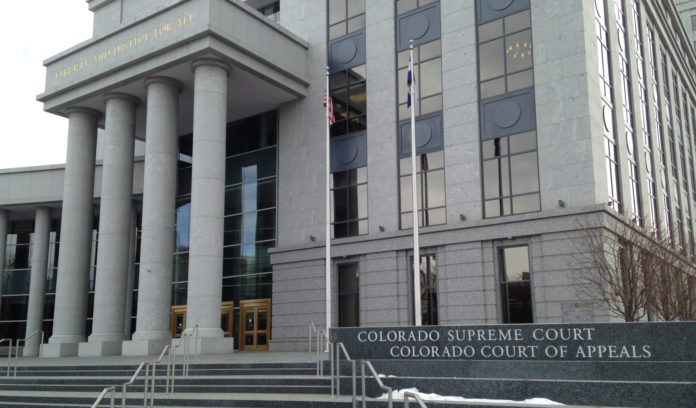
The Colorado Supreme Court will hear five oral arguments Oct. 18 on a range of issues including continuances, alternate suspects and a mayor’s office.
Tech Issues
This appeal connects back to an opinion in January when the Colorado Court of Appeals ruled a juvenile court abused its discretion denying a father’s, named in court documents as R.B., request for a continuance during a virtual termination hearing when R.B. was having technical difficulties.
The Jefferson County Division of Children, Youth and Families moved to terminate the legal relationship between R.B. and his newborn child, E.B. According to court records, E.B. was treated for opiate withdrawal and his umbilical cord tested positive for narcotics. A hearing on the motion was held virtually in 2021 due to the pandemic and R.B. had trouble accessing the hearing.
A continuance was requested for R.B. to testify later. The juvenile court denied the continuance saying R.B. had an opportunity to prepare and the motion to terminate parental rights was granted. The appeals court reversed and remanded to allow for R.B. to testify while reconsidering the father’s parental rights.
The high court will look at whether due process requires juvenile courts to grant a continuance for respondent parents to appear personally at a virtual hearing when counsel appears on behalf of the parents, even in the absence of showing a continuance is in the child’s best interest and actual prejudice.
Different Suspect
The Supreme Court will also look at whether a defendant can question an alternative suspect in front of the jury when that defendant asserts someone else committed the alleged crime they are on trial for, that assertion has evidentiary support and the alternate suspect takes the Fifth concerning the issue.
The high court will also look at other issues in the case including whether, when a court prohibits the defense from questioning an alternate suspect in front of the jury who invoked the Fifth, a defendant can tell the jury why they didn’t question the alternate suspect.
Finally it will look at whether, when a trial court erroneously prevented a defendant from questioning an alternate suspect, an appeals court can deem the error harmless without a remanded hearing establishing what evidence was improperly excluded.
The case goes back to when Nora Rios-Vargas appealed her conviction for burglary. Rios-Vargas also appealed her sentences for attempted criminal extortion and criminal impersonation which she already pleaded guilty to and are unrelated to the burglary case. The district court sentenced her on all three in a consolidated sentencing hearing.
Police tried to make contact with another suspect and never ruled them out, but after DNA evidence was linked to Rios-Vargas, she was charged with second-degree burglary. The defense argued the other suspect committed the burglary and framed Rios-Vargas. That suspect chose to remain silent and the district court determined it would not allow the suspect to take the stand only to take the Fifth.
The Colorado Court of Appeals looked at whether the district court properly allowed the witness to invoke the Fifth Amendment privilege against self-incrimination. The appeals court also reviewed Rios-Vargas’ claim the government violated her constitutional right to present a defense de novo.
The appeals court affirmed Rios-Vargas’ burglary conviction and vacated her sentences for attempted criminal extortion and criminal impersonation because those exceed the presumptive range for those crimes, which the prosecution agreed with. The case was remanded to the district court for resentencing.
Term of Office
Another oral argument involves Thornton Mayor Jan Kulmann and the city of Thornton.
The appeal concerns whether the office of the mayor is distinct from the office of a council member in Thornton, such that a term in office in one cannot be used as a term of office for the other when calculating Section 11’s two-term restriction. The case will also look at whether an elected official who only serves a partial term in office for legitimate reasons counts toward the calculation of Section 11’s two-term restriction.
According to the petition for writ of certiorari from the defendants, Kulmann and the city, the Colorado Constitution says no non-judicial elected official in a city can serve more than two consecutive terms in office.
In 2021 an Adams County District Court concluded the mayor’s office in Thornton was the same office as a council person for purposes of applying Section 11. That court further surmised Kulmann’s prior partial term as a council member should not be counted when considering Section 11’s two-term limit.
According to district court records, it also denied plaintiff Cherish Salazar’s, a resident of Thornton, argument Kulmann is prohibited from serving as the elected mayor beyond November 2021 pursuant to the two-term limit restriction.
The parties on both sides filed a notice of appeal, which was consolidated by the Colorado Court of Appeals. No decision in the appeals court has been made as the Supreme Court now handles the case.
According to the petition for writ of certiorari, Thornton’s government consists of nine city councilors, with one of them serving as mayor. Both the councilors and mayor serve four-year terms. Kulmann was elected to her first term as mayor in 2019. Prior to that she served as a city councilor beginning in 2013, getting reelected in 2017. She only served half her second term when she resigned to become mayor.
The city and Kulmann argued that under the district court’s order Kulmann is term-limited and precluded from running for a second term as mayor in 2023. If the order is reversed she can run for re-election in 2023.
For information on other oral arguments before the Colorado Supreme Court for October, click here.

